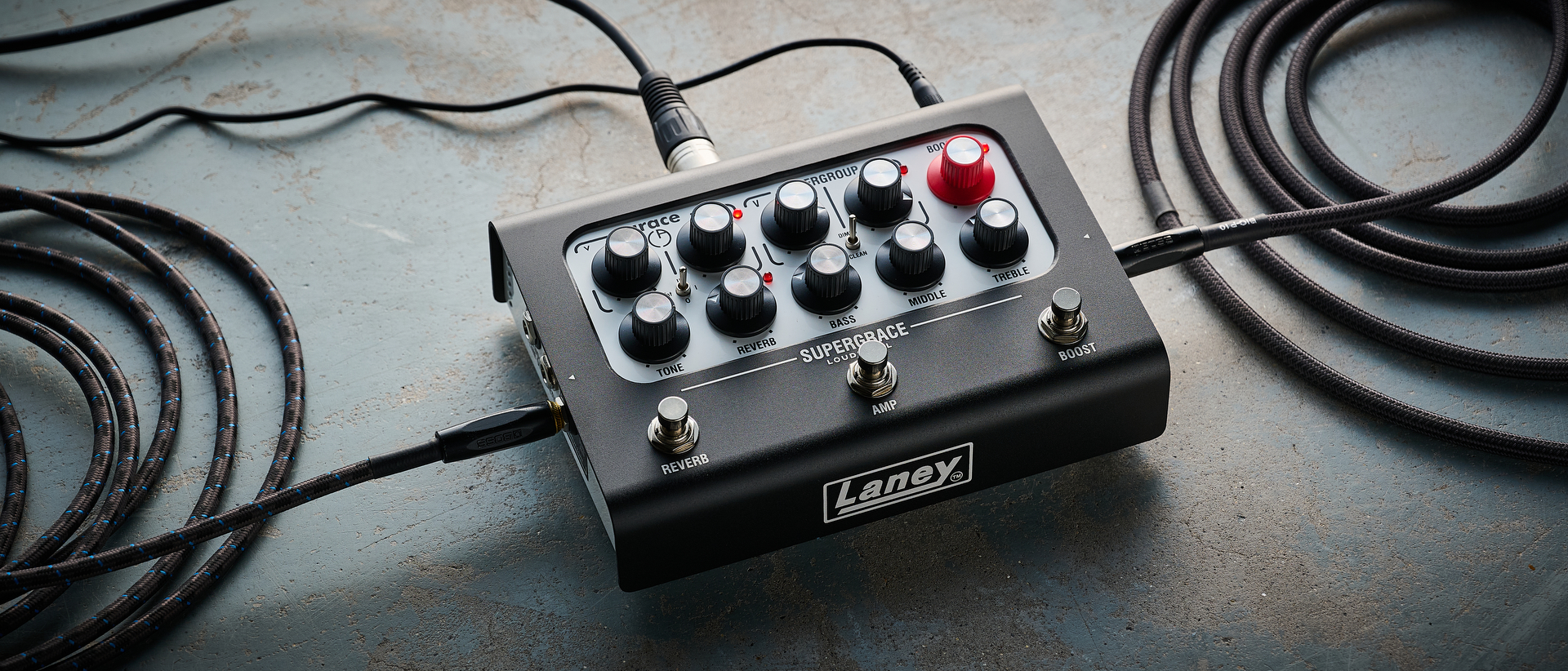Luca Brasi’s Tom Busby: “We actually made a conscious effort to put heaps less pressure on ourselves”
With all the odds stacked against them, Luca Brasi powered through a notably rough album cycle and a global health crisis back-to-back, coming out the other side with their strongest and most upbeat set of tunes yet. We know what you’re thinking: how the f*** did they do it!?

All the latest guitar news, interviews, lessons, reviews, deals and more, direct to your inbox!
You are now subscribed
Your newsletter sign-up was successful
The last time Australian Guitar caught up with Luca Brasi was in the winter of 2018, as the Tassie pub-rockers were gearing up to release their career-defining fourth album, Stay. To call it a monumental release would be an understatement: after the cracking the mainstream with their 2016 record, If This Is All We're Going To Be, all eyes were planted firmly on the foursome, desperate to see how they’d one-up themselves with a narrative-heavy epic co-produced with Aussie punk legend Darren Cordeaux (ex-Kisschasy). Understandably, the boys were nervous – but there was more to it than that.
Behind the scenes, Luca Brasi was struggling, and hard. They’d suddenly catapulted from local dive bars to capital city theatres, and were copping more media attention per week than they typically would in a year. Not to mention, the writing and recording processes for Stay were long and arduous, fraught with scheduling issues, pressure to succeed both internal and external, and severe lapses in mental health. Off the record, shredder Tom Busby admitted he was severely burnt out on songwriting; frontman Tyler Richardson made it clear that a fifth Luca Brasi record was anything but guaranteed.
And yet, somehow the band pushed through to make 2020 their most creatively gratifying year to date – ironically so, given how dire everything else in the world had been. Album #5 may be titled Everything Is Tenuous, but as far as the band themselves go, spirits have never been higher. When we link up with Busby to chat about the record, he looks almost surprisingly well-slept, and he’s quick to wax lyrical on how excited he is to be heading into a new album cycle.
So what the hell happened!? How did Luca Brasi buck the odds and come roaring back in tip-top shape – especially since the Stay era was anything but lowkey? Well, according to Busby, all it took was a few good riffs, a few cold beers and a few jam sessions that reminded them just how fun it can be to rock out with your best mates.
What brought you out of that slump post-Stay? Do you remember what lit the spark that led to those creative fireworks going off again?
At first it did feel like a bit of a chore. I was like, “Ah f***, do we really have to write new songs?” But luckily we had some riffs kicking around that were pretty cool – I had the music for “Tangled; Content”, which literally missed out on being a Stay song by four weeks, and Pat [Marshall, rhythm guitar] had the music for “This Selfish Love”. So we were like, “Right, let’s just f***ing get back to work.” But burnout was a good call: personally, I was belted after we finished Stay. I don’t know if it was because of outside factors, personal life, uni stress and all of that… I remember being very, very stressed, nervous and anxious about the whole ordeal. “Everyone’s going to hate it, this is shit, I’m shit…” So getting back into it for album number five, I was like, “Ah f***, here we go again…”
But after a few days it was just like, “Oh, we’re just hanging out with each other, playing some guitars, going to Pat’s house to sing some songs… This is actually fun!” I think we actually made a conscious effort to put heaps less pressure on ourselves. I was just like, “Ah yeah, here’s a song, I wrote it in four minutes,” and the next thing you know, Ty goes, “That’s really cool, man, I’ve already written the chorus!” We were really just f***ing around together – whereas with Stay, it was like, “Oh my God, every tiny little note and chord has to be absolutely perfect, neer, neer, neer!” This time it was like, “Yep, this is a G chord, that’s a C chord, there’s a song, you beauty!” It was heaps more relaxed, and we had a lot more fun making it.
What was it like doing this album almost entirely in-house?
We did “Tangled” and “Selfish Love” with Andrei Eremin in Melbourne, who was a gun and had great ideas – we sent him the demos and he’d be like, “Try changing this little bit.” So we’d try it and immediately go, “Oh! How did we not think of that!?” We discussed doing a few songs at a time so we didn’t have to be in a studio for three weeks, get there after work at six o’clock and be there ’til two in the morning – Pat and Danny [Flood, drums] have two kids each now, so it’s just not an option to do that anymore. And then Pat was the genius that said, “Why don’t we record the drums where we rehearse, and then record everything else ourselves?” We’ve got Line 6 Helix guitar modellers now, so we did one song like that as an experiment, Andre gave us some production notes and Darren Cordeaux gave us a few pointers, and then we got it mixed and we were like, “That sounds great!” So it was full steam ahead from there, the idea being that we wanted it to be a bit more casual… And then lockdown happened, so we had no choice anyways!
All the latest guitar news, interviews, lessons, reviews, deals and more, direct to your inbox!
Having complete control over this record, do you feel more attached to it, or would you say it’s more authentic to what Luca Brasi is at a core level?
Yeah, definitely. I think it absolutely is more authentic, and I think there was a freedom in just kind of being the masters of our own destiny. Because there are times when you work with producers where you’re like, “I kind of want to try this” and they’re like, “Nup, we should do it like this.” But when I’m by myself, I can do whatever I want – and if the idea sucks, I haven’t wasted anyone else’s time. We all really enjoyed the freedom, and I think it is definitely more authentic to who we are and what we wanted to portray, musically, this time around.
Were you excited to really push yourself as a player on this record, too?
Absolutely! There are habits that every guitar player falls into. [Everything Is Tenuous] isn’t really a complicated record – it’s probably our most straightforward one, actually, but we really pushed ourselves to try different things. On the first track, there’s a little guitar part that comes in the second verse – we were like, “Alright we need a second riff,” so I scratched up a part and went, “Yeah, that sounds good, that fits.” But then I went back to it later on, I was like, “I… Have literally done this exact part a million times.” It’s a little Blink-182-esque picking thing, and I was like, “No. Come on, man!” I had to step back and ask myself, “What do I want to do here? What would a country musician play?” That’s literally what I thought to myself – I’m a massive fan of Davey Lane and what he does in You Am I, and especially on Deliverance he’s got some real country-sounding licks in there. So I was like, “Alright, what would Davey Lane do?” And it doesn’t sound like a country song at all, but the idea stuck that I just wanted to do something different to what I normally would.
The guitar solos are back, too! We’ve got one on “Dying To Feel Alive” – I sent a rough idea to Pat and I was like, “Can we do this? Is this an okay thing to do?” And he was like, “F*** yeah, man! Get it!” Because we’d recently had a discussion about ‘90s guitar pop – we love the Goo Goo Dolls, the Gin Blossoms and all of that shit, and that was a major inspiration for the record. I was like, “Man, all these ‘90s pop songs all had guitar solos.” Even mainstream songs, like “When You’re Gone” by Bryan Adams and Mel C – there’s like a f***ing 16-bar guitar solo in the middle of it! This massive radio hit! So I was like, “Why the f*** are there no guitar solos anymore!?”

Ellie Robinson is an Australian writer, editor and dog enthusiast with a keen ear for pop-rock and a keen tongue for actual Pop Rocks. Her bylines include music rag staples like NME, BLUNT, Mixdown and, of course, Australian Guitar (where she also serves as Editor-at-Large), but also less expected fare like TV Soap and Snowboarding Australia. Her go-to guitar is a Fender Player Tele, which, controversially, she only picked up after she'd joined the team at Australian Guitar. Before then, Ellie was a keyboardist – thankfully, the AG crew helped her see the light…
